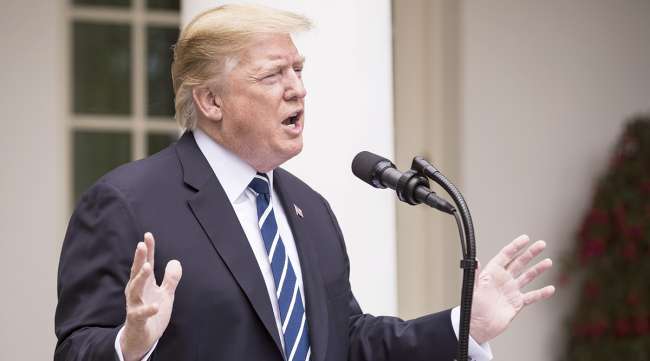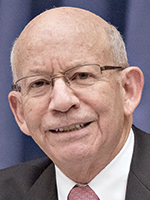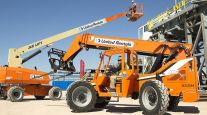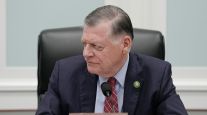Senior Reporter
Trump Shines Spotlight on Infrastructure Amid Uncertain Legislative Agenda

[Stay on top of transportation news: Get TTNews in your inbox.]
President Donald Trump continues to press lawmakers to take up an infrastructure funding package as part of ongoing COVID-19 relief efforts, repeating his desire to see action on a measure as April drew to a close and Senators readied a plan to return in early May to Capitol Hill.
“We want to do infrastructure, but a lot of people — a lot of the Republicans — would like to keep that as a separate bill,” Trump told reporters April 28, adding, “We have to rebuild our country.”
The president, who has maintained that launching a nationwide campaign focused on rebuilding the transportation networks would revamp the economy, in late March proposed a $2 trillion infrastructure package that would be backed by low-interest borrowing.
Compare each of the presidential candidates' plans for addressing America's infrastructure needs. See our Candidate Infrastructure Tracker.
So far during the pandemic, the president has signed into law emergency bills totaling nearly $3 trillion.
The rapid economic descent brought on by the pandemic has raised concerns among elected officials and industries eagerly pushing for a return to normalcy. Although the response from Republicans on an infrastructure measure has been tepid, senior Democrats have reacted with a strong show of support.
The Republican-led Senate as of press time was planning to return to Washington on May 4. House Democrats charged with managing their chamber’s schedule had not set a date for their return.

DeFazio
Rep. Peter DeFazio (D-Ore.), chairman of the transportation panel, touted the potential economic benefits that a large infrastructure funding bill could bring. His colleagues unveiled a five-year, $760 billion infrastructure plan at the start of the year. The House transportation committee also is crafting surface transportation legislation to update a highway law that expires this fall.
“The best way to restart our economy and put workers first is with a massive investment in the kind of infrastructure that will help future generations succeed — from better bridges and roads, to robust transit and passenger rail service, to fully functioning ports and harbors, to modernized waste and drinking water systems, and widely available broadband internet,” DeFazio said a day after the president’s remarks.

McConnell
Notwithstanding the messaging from the House and down Pennsylvania Avenue, debating a massive infrastructure plan is not on the Senate’s radar. Senate Majority Leader Mitch McConnell (R-Ky.) has encouraged senators to direct their energy on the ongoing economic response to the pandemic and avoid partisan distractions.
“We have an equal interest in doing an infrastructure bill. We don’t have an equal interest in borrowing money for future generations to pay for it,” McConnell said April 28. “I agree with the president. Infrastructure is important. I just don’t believe that we should be borrowing, adding to the national debt. We’ve added $2.8 trillion to the national debt in the last month.”
Last year, House Speaker Nancy Pelosi and Trump sought to collaborate on a long-term infrastructure package before negotiations ended prior to the president’s impeachment. Around the same time, a Senate committee approved a five-year highway bill. That bill’s floor consideration has not been scheduled.
Addressing the surface transportation system’s funding problem also has not been in the cards. The Senate measure did not propose a way to restore the long-term solvency of the Highway Trust Fund. House policymakers also have not announced a fix for the fund. The account helps states with projects, and it relies on now-insufficient revenue from the 18.4 cents-per-gallon gas tax and 24.4 cents-per-gallon diesel tax. Those rates were set in 1993.
Freight industry stakeholders, for the most part, have welcomed calls for an infrastructure funding package.
A consortium called Americans for Transportation Mobility supports investments in connectivity improvement projects. Members include the American Public Transportation Association, the American Society of Civil Engineers and American Trucking Associations.
Amid millions of COVID-induced job losses, this is the time to repair and modernize our nation’s infrastructure.
ATA President Chris Spear
ATA President Chris Spear suggested lawmakers consider a sustainable source of funding for the surface transportation system.
“Amid millions of COVID-induced job losses, this is the time to repair and modernize our nation’s infrastructure. It would yield measurable returns on investment, including putting hundreds of thousands to work, reducing the time and cost to deliver goods to customers throughout the country and taking a massive bite out of traffic and commute times. And rather than dumping trillions more in debt on our kids and grandkids, Congress can do the responsible thing and actually pay for this proposal," he told Transport Topics on April 29. "The only thing missing is the courage to do it.”
To address funding concerns, ATA proposed the Build America Fund that would generate $340 billion in about a decade through a 20-cents-per-gallon fee, phased in over four years, on motor fuels collected at the wholesale rack.
Want more news? Listen to today's daily briefing:





